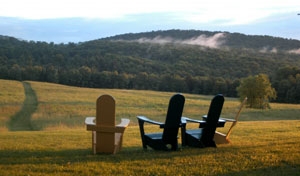Middlebury, Orion Magazine to Launch Environmental Writers’ Conference

Middlebury College and award-winning Orion magazine are teaming up to launch The Bread Loaf Orion Environmental Writers’ Conference, a unique forum modeled after Middlebury’s Bread Loaf Writers’ Conference (BLWC). The Middlebury College Environmental Studies Program, the oldest undergraduate environmental studies program in the nation, will also serve as a co-sponsor of the new conference. Beginning in 2014, the intensive week-long program is designed for those who want to bring more depth of knowledge and understanding to their writing about the environment and the natural world.
“Middlebury and Orion share a longstanding commitment to sustainability and a dedication to nurturing high-quality writing,” said Nan Jenks-Jay, dean of environmental affairs. Middlebury is recognized for its curricular programs as well as its campus operations that focus on the environment. Its BLWC is the oldest writers’ conference in America, famous for such participants as Robert Frost, John Irving and Julia Alvarez. Orion magazine is the foremost magazine for writing dedicated to nature and the environment, from fiction and poetry to narrative journalism.
The conference, which will take place June 9-15 at Middlebury’s Bread Loaf campus, will feature faculty that include writers Rick Bass, Jane Brox, Alison Hawthorne Deming, Camille Dungy, Maurice Manning and Alan Weisman. Among them are two finalists for the National Book Critic Circle’s Award, one finalist for the Pulitzer Prize, and an American Book Award winner. Their articles and poems have appeared in numerous publications, from the Atlantic and Audubon to the Norton Book of Nature Writing, The New Yorker and Orion.
Michael Collier, director of the BLWC, and H. Emerson Blake, editor in chief of Orion, will serve as co-directors of the new conference. “Since its inception in 1926, the Bread Loaf Writers’ Conference has cultivated a close relationship with nature and environmental writing,” said Collier “Our collaboration with Orion and the Middlebury Environmental Studies Program will allow us to deepen those relationships by bringing the Bread Loaf model of workshops and literary discussion to encourage and support the finest environmental writing in America.”
According to Collier, the new conference will benefit writers who want to improve their writing about the environment; poets who are drawn to writing about the natural world; environmental professionals who want to strengthen their writing skills; and those who seek to become better advocates for the environment through their writing.
Like the BLWC, the new conference will incorporate small specialized classes focusing on the craft of writing. Lectures and readings will take place daily. Editors and agents will attend the conference and be available to meet with participants about their work.
For information about the conference, including information about grants and scholarships, visit http://www.middlebury.edu/blwc/BLOrion.

